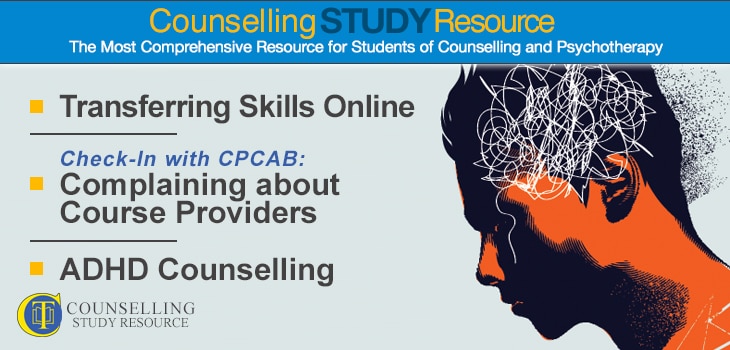146 – ADHD Counselling
Transferring Counselling Skills Online – Complaining about Course Providers
In episode 146 of the Counselling Tutor Podcast, Ken Kelly and Rory Lees-Oakes talk about Counselling Tutor’s response to the effect on counsellors of the COVID-19 pandemic, discussing our new online course to support you to switch to online and telephone counselling. ‘Check-In with CPCAB’ then explores complaints processes for students of counselling and psychotherapy. Finally, in ‘Practice Matters’, Rory interviews counsellor Samantha Davies about attention deficit hyperactivity disorder or ADHD counselling.
Transferring Counselling Skills Online (starts at 2.05 mins)
We are living in extraordinary times with the current COVID-19 pandemic.
This situation has led both qualified and student counsellors to begin to work online (by live-chat, video or email) and by telephone – and questions relating to this have become the hottest topic currently being discussed in the Counselling Tutor Facebook group. This requires considerable further training and personal development.
While the technology required to work online might seem the biggest hurdle to overcome, in fact there are many other important areas to consider, including:
- confidentiality and its limits
- managing and storing data
- registration with the Information Commissioner’s Office (for UK counsellors)
- differences in how psychological contact is made
- ethical implications
- lack of visual clues when working without sight of the client
- self-awareness of the counsellor
- implications of, in effect, stepping into someone’s home.
The six-strong Counselling Tutor team, together with support from external providers, has risen to this challenge, and worked long and hard to create an online course that addresses all these aspects and more.
The learning that the 900+ current participants (from all over the world) are gaining from this is likely to remain highly relevant into the future.
Rory predicts that the COVID-19 situation will have led to online counselling ‘coming of age’ internationally, with many counsellors and clients choosing to continue working either partly or even wholly online.
While online working was – for example, when Ken undertook in-depth training in online counselling some years ago – previously considered an opportunity to widen your client base, it has now become a necessity in order to continue to support clients at this time when mental wellbeing is being so acutely challenged by isolation, fear, threat to physical health etc.
Counselling Tutor’s purpose-designed new course, Online and Telephone Counselling, includes over 30 hours of guided training and self-directed videos course, with an online support group and community where you connect with other participants and get to practise your new skills with a course buddy.
Priced at just £49.99, you can find out more and sign up via the Counselling Tutor website.
Check-In with CPCAB: Complaining about Course Providers (starts at 15.00 mins)
Rory talks to Kelly Budd (Head of Qualifications) at CPCAB (Counselling & Psychotherapy Central Awarding Body) about what to do if you are dissatisfied with the standard of provision at your course provider.
Kelly explains that the first step should be to talk informally to your course tutor, being willing to own your feelings about the matter (e.g. using ‘I’ in describing how you experience the course provision).
If you can’t resolve the issue in this way, you can then escalate it to the college itself; all course providers have a complaints procedure in place that will explain how to do this. There may also be opportunities to share your views through a mechanism known as ‘Learner Voice’.
It is only at a later stage that CPCAB, as the awarding body, may get involved in a complaint – unless this involves an issue directly in its remit, for example regarding the validity of a certificate or a complaint directly about CPCAB.
Kelly asserts that the process of complaining – and the reflection on your own thoughts, feelings and behaviours that this involves – is valuable experience for how you would deal with any difficulties with clients. So do try to view it positively: as an opportunity to learn more about yourself, your way of relating to others, and the relevant procedures.
You can find more information about CPCAB on its website. CPCAB is the UK’s only awarding body run by counsellors for counsellors.
ADHD Counselling (starts at 29.30 mins)
As part of Counsellor CPD, a brand-new service from Counselling Tutor aimed at qualified counsellors, specialist counsellor Samantha Davies has recorded an on-demand online lecture on ADHD counselling.
Samantha has personal experience of ADHD – one type of neurodiversity – and specialises in working with clients who have ADHD.
Rory interviews Samantha about her lecture on ADHD counselling, which will explain the three different types of this complex brain order.
Samantha describes how easy it would be to misread the behaviours of a client with ADHD (for example, seeing their body language as expressing anxiety, or their difficulties in attending appointments as avoidance – neither of which might be true at all).
